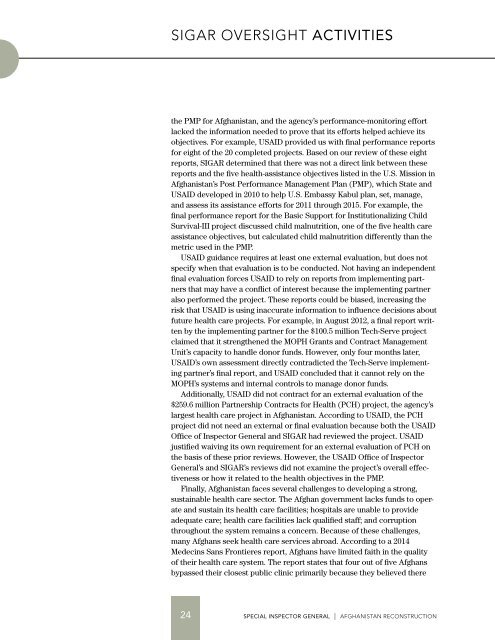SIGAR
2017-01-30qr
2017-01-30qr
You also want an ePaper? Increase the reach of your titles
YUMPU automatically turns print PDFs into web optimized ePapers that Google loves.
<strong>SIGAR</strong> OVERSIGHT ACTIVITIES<br />
the PMP for Afghanistan, and the agency’s performance-monitoring effort<br />
lacked the information needed to prove that its efforts helped achieve its<br />
objectives. For example, USAID provided us with final performance reports<br />
for eight of the 20 completed projects. Based on our review of these eight<br />
reports, <strong>SIGAR</strong> determined that there was not a direct link between these<br />
reports and the five health-assistance objectives listed in the U.S. Mission in<br />
Afghanistan’s Post Performance Management Plan (PMP), which State and<br />
USAID developed in 2010 to help U.S. Embassy Kabul plan, set, manage,<br />
and assess its assistance efforts for 2011 through 2015. For example, the<br />
final performance report for the Basic Support for Institutionalizing Child<br />
Survival-III project discussed child malnutrition, one of the five health care<br />
assistance objectives, but calculated child malnutrition differently than the<br />
metric used in the PMP.<br />
USAID guidance requires at least one external evaluation, but does not<br />
specify when that evaluation is to be conducted. Not having an independent<br />
final evaluation forces USAID to rely on reports from implementing partners<br />
that may have a conflict of interest because the implementing partner<br />
also performed the project. These reports could be biased, increasing the<br />
risk that USAID is using inaccurate information to influence decisions about<br />
future health care projects. For example, in August 2012, a final report written<br />
by the implementing partner for the $100.5 million Tech-Serve project<br />
claimed that it strengthened the MOPH Grants and Contract Management<br />
Unit’s capacity to handle donor funds. However, only four months later,<br />
USAID’s own assessment directly contradicted the Tech-Serve implementing<br />
partner’s final report, and USAID concluded that it cannot rely on the<br />
MOPH’s systems and internal controls to manage donor funds.<br />
Additionally, USAID did not contract for an external evaluation of the<br />
$259.6 million Partnership Contracts for Health (PCH) project, the agency’s<br />
largest health care project in Afghanistan. According to USAID, the PCH<br />
project did not need an external or final evaluation because both the USAID<br />
Office of Inspector General and <strong>SIGAR</strong> had reviewed the project. USAID<br />
justified waiving its own requirement for an external evaluation of PCH on<br />
the basis of these prior reviews. However, the USAID Office of Inspector<br />
General’s and <strong>SIGAR</strong>’s reviews did not examine the project’s overall effectiveness<br />
or how it related to the health objectives in the PMP.<br />
Finally, Afghanistan faces several challenges to developing a strong,<br />
sustainable health care sector. The Afghan government lacks funds to operate<br />
and sustain its health care facilities; hospitals are unable to provide<br />
adequate care; health care facilities lack qualified staff; and corruption<br />
throughout the system remains a concern. Because of these challenges,<br />
many Afghans seek health care services abroad. According to a 2014<br />
Medecins Sans Frontieres report, Afghans have limited faith in the quality<br />
of their health care system. The report states that four out of five Afghans<br />
bypassed their closest public clinic primarily because they believed there<br />
24<br />
SPECIAL INSPECTOR GENERAL I AFGHANISTAN RECONSTRUCTION







